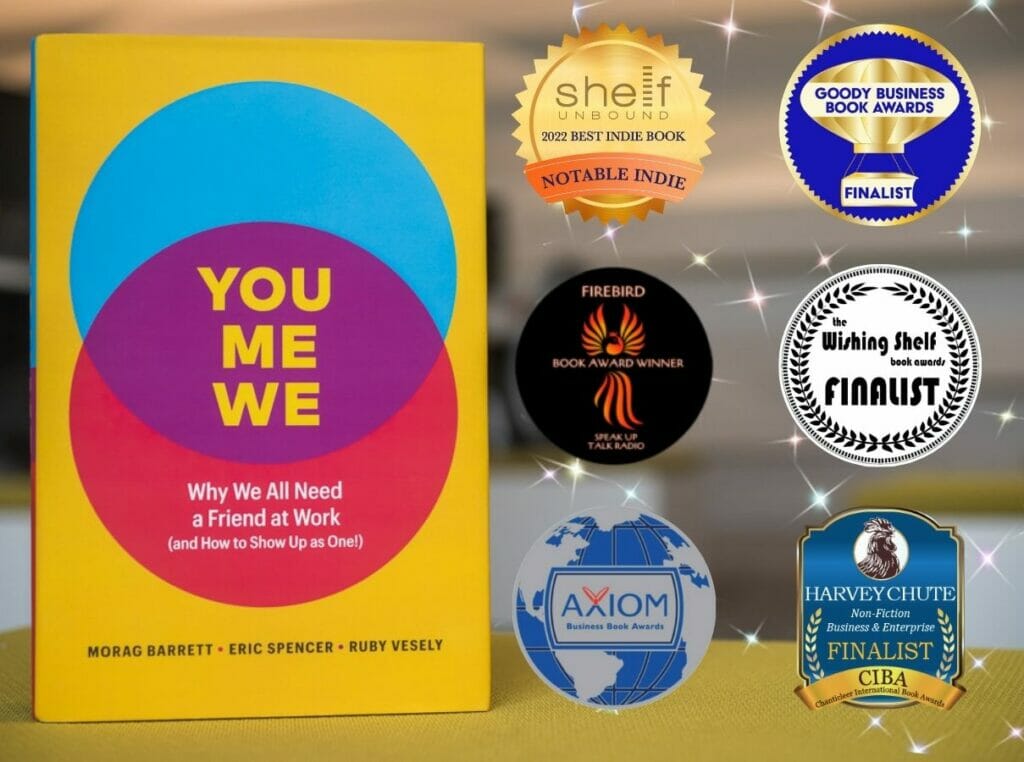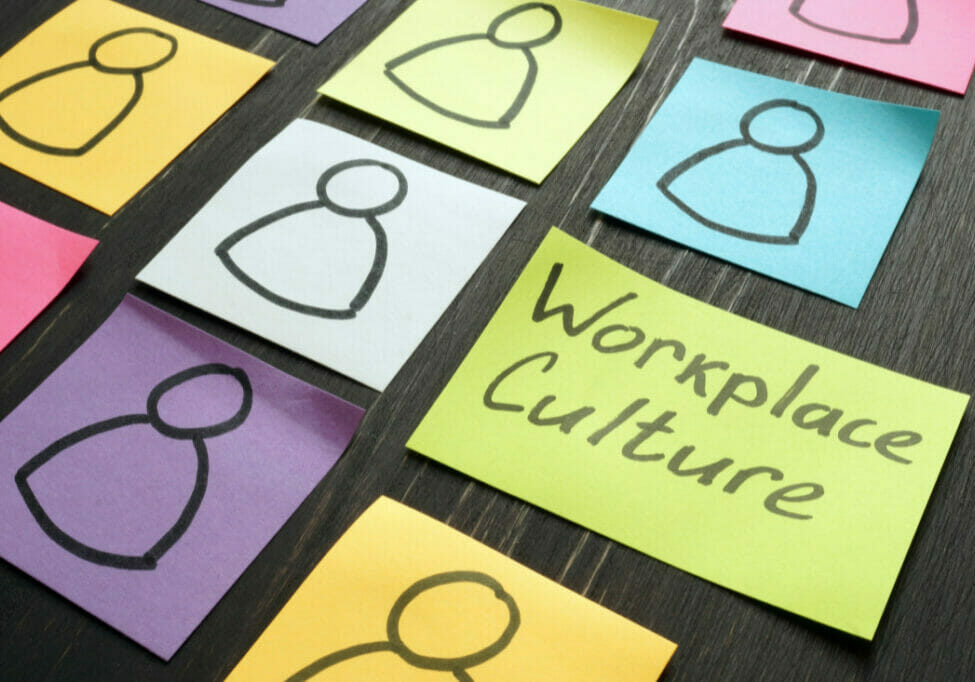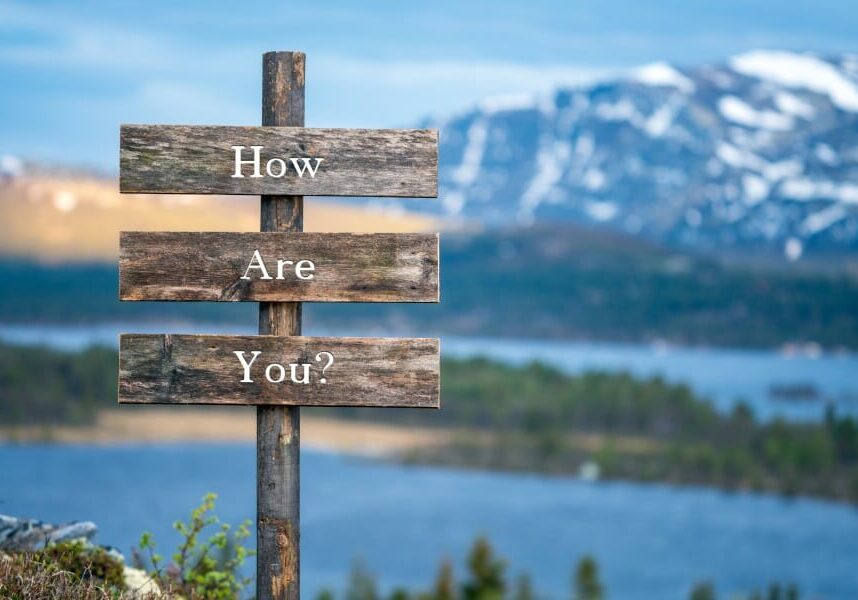Want to Make a Friend at Work? Start With Yourself.

When was the last time you went first?
We don’t mean running to the dessert table before everyone else (though that sounds brilliant), but jumping into a new way of thinking, doing, or being before anyone else around you is.
We’re firm believers in going first, especially when it comes to building the powerful ally relationships we talk about in our new book You, Me, We: Why We All Need a Friend at Work (and How To Show Up As One!).
After all, if you want to make a change, you need to be the change. (Think Michael Jackson’s Man in the Mirror. Bonus points if you can also perform those killer dance moves.)
This is more than just a “get yourself together” kind of sentiment. Before you can be an ally (aka. unconditional support and a friend at work) to someone else, you first need to be an ally to yourself.
Having a friend at work has a profound, lasting impact on your career and organization, but if you don’t know how to support yourself, you’ll have a hard time supporting others.
Adopting an Ally MindsetTM always begins with yourself first.
The Power of the Ally MindsetTM
So, what’s an Ally Mindset? (And what’s yours? Find out with our free Ally Mindset profile.)
“The Ally Mindset is all about forging the human connection, and it is the first step in building stronger relationships on the job by creating allies—people whom you can count on, whom you can depend on, who care about you, and who trust you – your friend at work…. It’s an intentional, conscious choice to be proactive and thoughtful in your relationships rather than reactive and defensive in your interactions.” Us, in You, Me, We

“The Ally Mindset is all about forging the human connection”
the three of us in You, Me, We
The Ally Mindset is made up of five essential practices that equip us to make a friend (or five) at work and be a best friend to everyone around us. We’re not suggesting pajama parties and pillow fights – we’re talking about deep, meaningful friendships that impact the quality of your life and work.
Statistic after statistic shows that having a friend at work makes work better. We become more productive (21%), safer (36% fewer incidents), and less likely to leave our job (12%).
We work better and enjoy our work more when we have an ally.
Your First Ally Should Be Yourself
But before you can be an ally to others, you need to be an ally to yourself.
Sound counterintuitive? Let’s take a look at the five essential practices.

- Abundance and Generosity
Abundance is a mindset. It’s believing there are enough resources, enough success, enough everything to go around. When you believe that you have enough, it’s easier to share. Generosity is the result of that abundance mindset. It’s giving freely with, wait for it, no strings attached.
Beautiful things happen when you practice abundance and generosity, not just for others but for yourself. When you believe there’s enough success for everyone, you relieve yourself of the stress of competing against others. Yes, they can win, but you can too.
You feel free to give generously to your own needs, dreams, and wants while still giving to others. In fact, we’d argue you give even more generously to others when you’re attending to your own hopes and dreams.
- Connection and Compassion
Connection is about building relationships with others, but deep ally-level connection and being a friend at work also requires compassion – having empathy for the highs and lows of others and a desire to help them.
Connection and compassion build stronger, more empathetic relationships. And, if you’re a leader, help you develop a more collaborative, resilient team.
But many of us don’t practice self-compassion very well. Think about the ways you talk to yourself. Would you speak to someone else that way?
If you did, would it help them? (Hint: NO.)
A lack of self-compassion will often lead you to self-condemnation and self-pity, which ultimately, makes you more focused on yourself and your failures than on the relationships around you.
Don’t excuse your failings but give yourself some compassion. You, like everyone else, are allowed to be human.
- Courage and Vulnerability
Yes, we said the V-word….We like to think Brene Brown would be proud of us. Courage is about admitting our shortcomings and mistakes and being open to honest and candid feedback. It’s not an absence of fear or discomfort but a consistent choice to face them and not run away.
Vulnerability is harder, and it doesn’t have the same fanbase courage does. It’s owning up to our fears or concerns and asking others for help. It’s being our authentic self, even (especially) when we don’t have it all together.
Courage only works when we have the conviction to be true to ourselves. To be a friend at work (and in life) for ourselves. We have to be courageous with ourselves before we can be courageous with others. It’s why courage and vulnerability are so closely linked in the Ally Mindset. Being your authentic self only works when you are willing to explore who your authentic self is, and that takes courage.
- Candor and Debate
Candor is about honesty and transparency. It’s kindly saying what you really think because good leaders know they have to speak the truth, even when it’s uncomfortable. Debate is the willingness to take a stand on an issue while still respectfully exploring it in discussions with others. It’s being able to disagree with others and still get along (despite what you see on the internet, this can and does happen).
While candor and debate are played out in relationships with others, they are only possible when you start with yourself (are you sensing a theme yet?). You can’t be candid with others until you know what you truly think and feel. Honesty with others depends on our level of honesty with ourselves. And the kind of productive debate we discuss in You, Me, We can only happen when you have acknowledged to yourself what your own position is.
- Action and Accountability
This last practice of the Ally Mindset is about doing. It’s moving beyond mindset and thinking to making choices. Action is about keeping your word and being trustworthy. It’s doing what you say you’re going to do when you say you’ll do it. Accountability is serving and supporting others proactively. It’s servant leadership in action.
Both mean that you go first in your actions – stepping out to tangibly serve and support when no one else is, rather than complaining about the situation around you.
You can’t practice these attributes effectively if you aren’t serving and supporting yourself while you serve and support others. Every parent who’s ever flown has been told to put the oxygen mask on themselves before they can put it on their child. Ignore your own needs to the peril of yourself and the people you want to serve. You’ll burn out, get resentful, and hurt yourself and others in the process.
Be an Ally to Yourself So You Can Be an Ally to Others.
We aren’t advocating a single-minded pursuit of your own goals and wants with no thought for those around you. Being an ally to yourself is not the same as a me-first mindset, so please don’t be a jerk and use this article as a reason.
But if you find yourself hiding your truth, beating yourself up, or not meeting your own needs, then you are not going to be the friend to others you want and need to be. You can support others better when you support yourself.
So go ahead, take a look at yourself, and make that change.

Let's Connect





